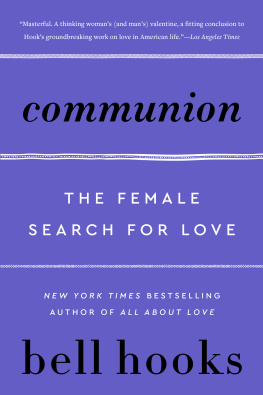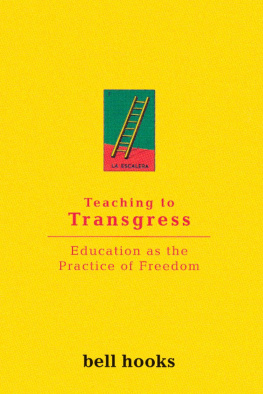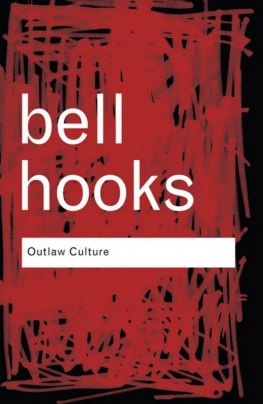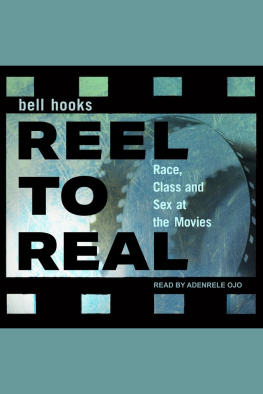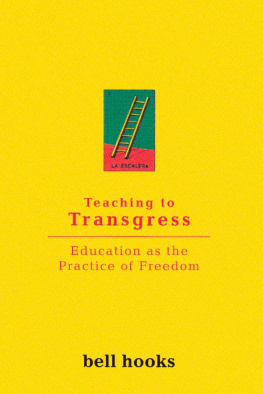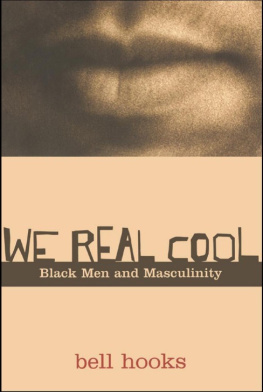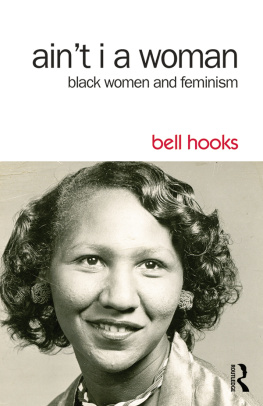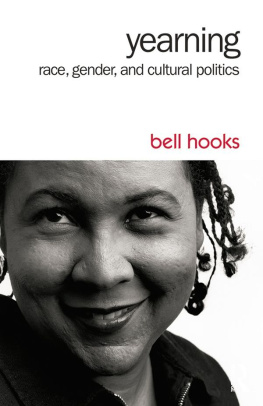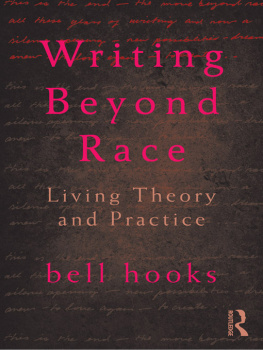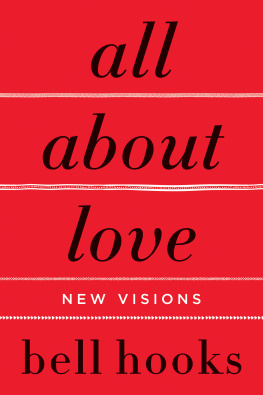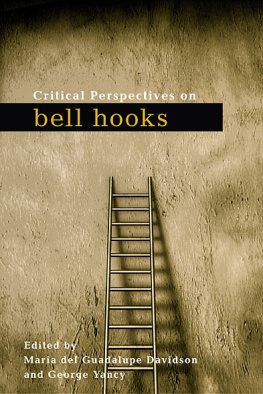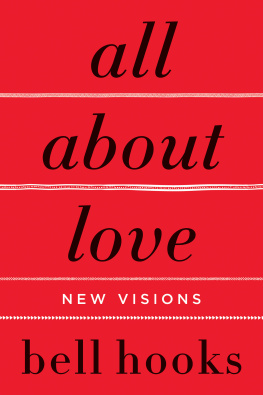bell hooks - Communion
Here you can read online bell hooks - Communion full text of the book (entire story) in english for free. Download pdf and epub, get meaning, cover and reviews about this ebook. year: 2021, publisher: William Morrow Paperbacks, genre: Romance novel. Description of the work, (preface) as well as reviews are available. Best literature library LitArk.com created for fans of good reading and offers a wide selection of genres:
Romance novel
Science fiction
Adventure
Detective
Science
History
Home and family
Prose
Art
Politics
Computer
Non-fiction
Religion
Business
Children
Humor
Choose a favorite category and find really read worthwhile books. Enjoy immersion in the world of imagination, feel the emotions of the characters or learn something new for yourself, make an fascinating discovery.
- Book:Communion
- Author:
- Publisher:William Morrow Paperbacks
- Genre:
- Year:2021
- Rating:3 / 5
- Favourites:Add to favourites
- Your mark:
- 60
- 1
- 2
- 3
- 4
- 5
Communion: summary, description and annotation
We offer to read an annotation, description, summary or preface (depends on what the author of the book "Communion" wrote himself). If you haven't found the necessary information about the book — write in the comments, we will try to find it.
Communion — read online for free the complete book (whole text) full work
Below is the text of the book, divided by pages. System saving the place of the last page read, allows you to conveniently read the book "Communion" online for free, without having to search again every time where you left off. Put a bookmark, and you can go to the page where you finished reading at any time.
Font size:
Interval:
Bookmark:
To all of you who dance with me in the circle of love
To Anthony with whom I whirl and whirl and whirl
There is an eros present at every meeting, and this is also sacred. One only has to listen inwardly to the histories and resonances of the word we use for religious experience. In Sanskrit the word satsang, which translates into English as meeting, means godly gathering. In the English language the word common is linked through the word communicate to communion.... To exist in a state of communion is to be aware of the nature of existence.
S USAN G RIFFIN
W OMEN talk about love. From girlhood on, we learn that conversations about love are a gendered narrative, a female subject. Our obsessions about love begin not with the first crush or the first fall. They begin with that first recognition that females matter less than males, that no matter how good we are, in the eyes of a patriarchal universe we are never quite good enough. Femaleness in patriarchal culture marks us from the very beginning as unworthy or not as worthy, and it should come as no surprise that we learn to worry most as girls, as women, about whether we are worthy of love.
Raised with competitive, fault-finding mothers and fathers whom we can never really please or in a world where we are the perfect Daddys girl who fears losing his approval to the point where we stop eating, stop growing up because we see Daddy losing interest, because we see he does not love women, we are uncertain about love. To keep his love we must cling to girlhood at all costs. All girls continue to be taught when they are young, if not by their parents then by the culture around them, that they must earn the right to be lovedthat femaleness is not good enough. This is a females first lesson in the school of patriarchal thinking and values. She must earn love. She is not entitled. She must be good to be loved. And good is always defined by someone else, someone on the outside. Writing about her relationship with her dad in the essay Dancing on My Fathers Shoes, Patricia Ruff offers a heartrending account of losing the sense of being worthy of love, of being valued, confessing, My mother told me that he wanted a daughter first and couldnt have been more delighted when he got me. So I was unprepared when my princess status, quite without warning, was ripped away raggedly, like a sheet of paper torn from a notebook. Something happened that no one explained to me.... I had no voice for my feeling and was without words for the anger and pain over his being suddenly beyond reach. Concerned that her younger sister might feel the same pain of being emotionally rejected, Ruff suggested that they confront their father together: We burst into their bedroom, threw ourselves on our stunned father, who remained stone still and speechless as we cried all over him, grabbing him, holding on, not wanting to let go. Daddy, please hold us, tell us you love us, we love you, we need you to love us, we begged. Rejection and abandonment by fathers and mothers is the space of lack that usually sets the stage for female desperation to find and know love.
Often girls feel deeply cared about as small children but then find as we develop willpower and independent thought that the world stops affirming us, that we are seen as unlovable. This is the insight Madonna Kolbenschlag shares in Lost in the Land of Oz about the nature of a females fate: In some fundamental way, we have all been deprived of love, of motheringif not of love, then of the feeling that we have been loved. Knowing we were loved is not enough; we have to feel it. How can any girl sustain the belief that she is loved, truly loved, when all around her she sees that femaleness is despised? Unable to change the fact of femaleness, she strives to make herself over, to become someone worthy of love.
Schooled to believe that we find ourselves in relation with others, females learn early to search for love in a world beyond our own hearts. We learn in childhood that the roots of love lie outside our capabilities, that to know love we must be loved by others. For as females in patriarchal culture, we cannot determine our self-worth. Our value, our worth, and whether or not we can be loved are always determined by someone else. Deprived of the means to generate self-love, we look to others to render us lovable; we long for love and we search.
While contemporary feminist movement critiqued the devaluation of the female that begins in girlhood, it did not change it. Todays girls grow up in a world where they will learn from many quarters that women are the equals of men, but there is still no real place for feminist thinking and practice in girlhood. Girls today struggle against sexist defining roles in the same ways that girls did before the contemporary feminist movement. While strands of feminism here and there support that struggle, more often than not, girls feel besieged by the mixed messages that come from being born into a world where womens liberation has been given a small place even as girls remained trapped in the arms of patriarchy. A measure of that entrapment is the widespread fear among all girls, irrespective of race or class, that they will not be loved.
Within patriarchal culture, the girl who does not feel loved in her family of origin is given another chance to prove her worth when she is encouraged to seek love from males. Schoolgirl crushes, mad obsessions, compulsive longings for male attention and approval indicate that she is rightly pursuing her gendered destiny, on the road to becoming the female who can be nothing without a man. Whether she is heterosexual or homosexual, the extent to which she yearns for patriarchal approval will determine whether she is worthy to be loved. This is the emotional uncertainty that haunts the lives of all females in patriarchal culture.
From the start, then, females are confused about the nature of love. Socialized in the false assumption that we will find love in the place where femaleness is deemed unworthy and consistently devalued, we learn early to pretend that love matters more than anything, when in actuality we know that what matters most, even in the wake of feminist movement, is patriarchal approval. From birth on, most females live in fear that we will be abandoned, that if we step outside the approved circle, we will not be loved.
Given our early obsessions with seducing and pleasing others to affirm our worth, we lose ourselves in the search to be accepted, included, desired. Our talk about love has heretofore primarily been a talk about desire. For the most part, the feminist movement did not change female obsession with love, nor did it offer us new ways to think about love. It told us that we were better off if we stopped thinking about love, if we could live our lives as though love did not matter, because if we did not do so we were in danger of becoming a member of a truly despised female category: the woman who loves too much. The irony, of course, is that most of us were not loving too much; we were not loving at all. What we were was emotionally needy, desperate for the recognition (whether from male or female partners) that would prove our worth, our value, our right to be alive on the planet, and we were willing to do anything to get it. As females in a patriarchal culture, we were not slaves of love; most of us were and are slaves of longingyearning for a master who will set us free and claim us because we cannot claim ourselves.
Feminism offered us the promise that a culture would be created where we could be free and know love. But that promise has not been fulfilled. Many females are still confused, wondering about the place of love in our lives. Many of us have been afraid to acknowledge that love matters, for fear we will be despised and shamed by women who have come to power within patriarchy by closing off emotions, by becoming like the patriarchal men we once critiqued as cold and hard-hearted. Power feminism is just another scam in which women get to play patriarchs and pretend that the power we seek and gain liberates us. Because we did not create a grand body of work that would have taught girls and women new and visionary ways to think about love, we witness the rise of a generation of females in our late twenties and early thirties who see any longing for love as weakness, who focus our sights solely on gaining power.
Font size:
Interval:
Bookmark:
Similar books «Communion»
Look at similar books to Communion. We have selected literature similar in name and meaning in the hope of providing readers with more options to find new, interesting, not yet read works.
Discussion, reviews of the book Communion and just readers' own opinions. Leave your comments, write what you think about the work, its meaning or the main characters. Specify what exactly you liked and what you didn't like, and why you think so.

